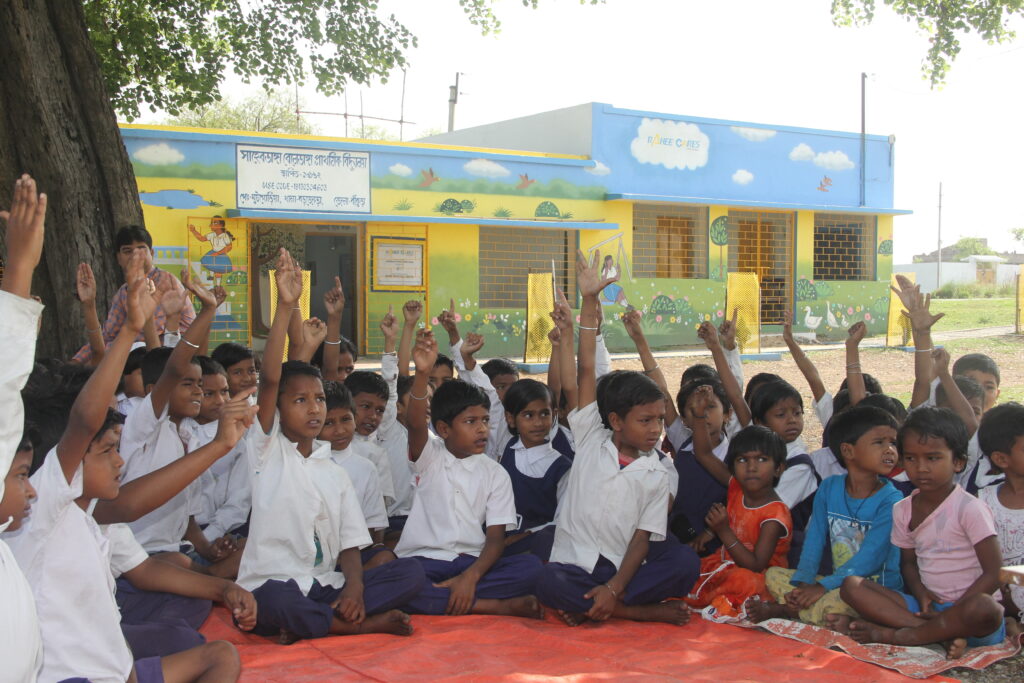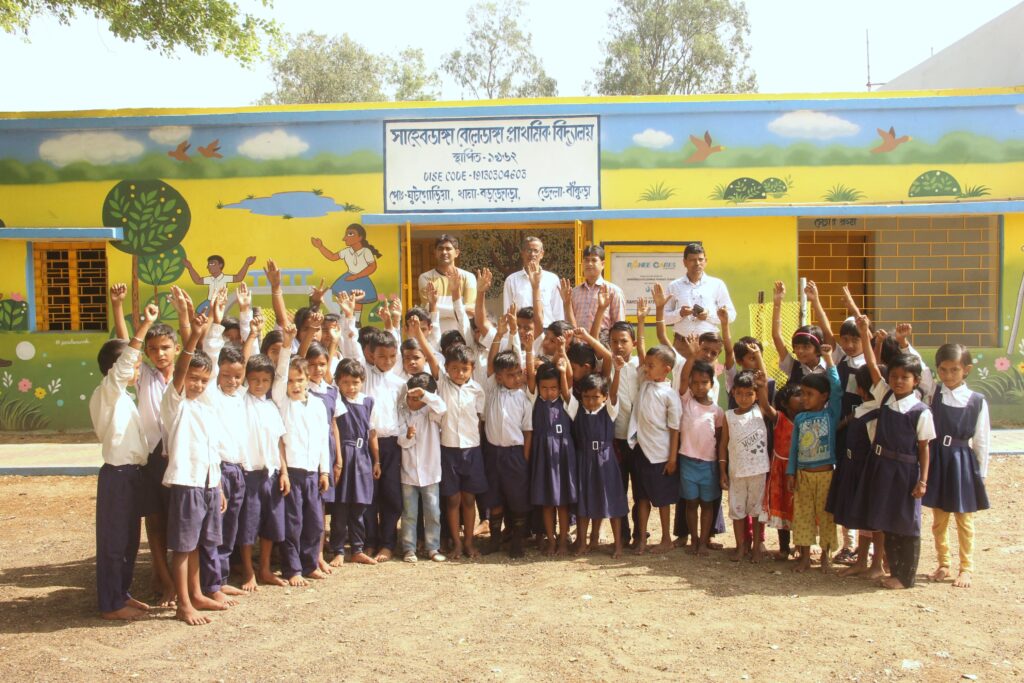Explore DITO Social Welfare Association’s Climate Resilient School Transformation Programme in Barjora, Bankura, West Bengal. This initiative revitalizes Anganwadi Centres and schools with climate-resilient infrastructure, safe water access, and essential facilities, fostering holistic development, gender inclusivity, and sustainable education. Through partnerships with government and private entities, DITO enhances learning environments for young children and supports mothers’ health and nutrition. Witness how DITO’s commitment to quality education, health, and gender equality drives progress toward India’s Sustainable Development Goals, transforming lives and paving the way for a brighter future.

March 2023, Bankura, West Bengal- During a time when India faced the untoward fatalities of malnutrition, poverty, child marriage, infant and maternal mortality due to nil access to health care services, and a lack of awareness relating to health and nutrition, child labour, illiteracy and innumeracy etc. the Integrated Child Development Services (ICDS) of 1975 was a commendable step to address the situation.
The Integrated Child Development Services (ICDS) scheme, aims to promote holistic development, general wellness, and nutrition of children under six years of age and pregnant and breastfeeding mothers’ nutritional, mental, and physical well-being. Initially enforced through 33 projects in Below Poverty Line (BPL) blocks all over the country, today this program reaches out to 8.06 million expecting and nursing mothers and 39.35 million children under the age of 6. Going along the lines of Article 39(F) of the Indian Constitution, the scheme provides nutritional meals, preschool education, primary healthcare, immunization, frequent health check-ups and referral services to the former beneficiaries.
The tenth five-year plan also linked ICDS with Anganwadi centres (AWCs) mainly in the rural areas, staffed with Anganwadi Workers (AWWs) and Anganwadi Helpers (AWHs). These AWCs are a pivotal element of the programme as all services are provided under one roof.
However several Anganwadis, including some of those of the Coal Mining Barjora block in the Bankura district of West Bengal, indicate some serious issues in retaining children in the schooling system. The Climate Resilient School Transformation Programme taken up by the DITO Social Welfare Association, an Indian non-profit, non-governmental organization, in collaboration with the CSR unit of RAHEE Infratech Ltd., aims at creating a transformational education system by improving the infrastructure and curriculum facilities in the educational centres and AWCs of the Barjora region, to foster a better literacy terrain that is gender and disability inclusive, accessible for all, safe, child-friendly, non-violent and functional (as cited in Right to Education Act, 2004), thus curtailing the dropout rates subsequently. A cluster-based approach was adopted for the most part, for not only carrying out the aforesaid mission but also for creating climate-resilient technologies, thus making this initiative sustainable and efficient in the long run.
A field research was conducted by the team of DITO in Ghutgoria Gram Panchayat in Barjora, and it was seen that government-run and aided Anganwadis in the region are facing a huge drop in enrolment due to a lack of basic facilities like hygiene and sanitation. For every 1000 households, there is one Anganwadi Centre (AWC) as put forward by the ICDS, hence the numbers are huge and concerning. Thus a needs-based assessment was carried out by the DITO team, where they conversed with the locals and the Anganwadi workers (AWWs). They found out that the AWCs affiliated to the ICDS programme in that area lacked in basic amenities, such as running water and sanitation, electricity, potable drinking water quality and supply, faulty or non-existent infrastructure like buildings, classrooms, toilets, urinals, sanitary napkin vending machines, kitchen gardens, etc. which needed urgent renovation. These obsolete and defunct amenities within these premises’ were not at par with the guidelines quoted in the National Education Policy (NEP) 2020 for the standards of “Service Environment and Culture” (Clause 5.9, NEP 2020).
This project was implemented in 12 schools and AWCs, many of which were deprived of electricity and water supply as there was nil electric connectivity, and the nearest water reservoir was not in proximity to these sites. In the initial stage of the Climate Resilient School Transformation Programme, the electric supply and water supply were regulated. An electricity connection was legalised by establishing electric poles and night lights, by collaborating with the West Bengal State Electricity Distribution Company Ltd. (WBSEDCL), and water supply was administered in these sites with the collaboration of the Ghutgoria Gram Panchayat. This was a crucial step in the process as the amendments of the other educational parameters of these sites and their functionality were reliant on it.
Having replaced the existing 10+2 structure of schooling, the National Education Policy (NEP) 2020 aspires to embrace education from preschool (up to age 5) to secondary school with the new 5+3+3+4 structure. DITO’s Climate Resilient School Transformation Programme was executed in a sustainable and scalable way by involving the government, private enterprises and civilians to achieve it.
Through DITO’s initiative, numerous improvements were made in the schools and AWCs of Barjora.
– The Anganwadi Centres (AWCs) were equipped with climate-resilient infrastructure, baby-friendly washrooms, hand wash basins and play-based learning toolkits. The boundary walls were either constructed or repaired, baby changing stations were established, the water quality was determined and water filters were set up, thus transforming these Anganwadis into a ‘Rahee Anandashalas’. Orientation drives for caregivers and counselling sessions with pregnant and lactating women and adolescent girls by professional instructors have also been implemented in these Rahee Anandshalas.

Through revolutionary schemes by the Government of India such as the Sarva Shiksha Abhiyan (now the Samagra Shiksha) 2002, the Right of Children to Free and Compulsory Education (RTE) Act of 2009, and the NEP 2020, India has made momentous progress in recent years in acquiring near-universal enrolment in preliminary education. These outstanding improvements make it a step closer to attaining the 4th Sustainable Development Goal (SDG) for 2030– “Ensure inclusive and equitable quality education and promote lifelong learning opportunities for all”, which was facing a hindrance in the case of the educational parameters of the Anganwadis of Ghutgoria Gram, where the State Government and local governments were failing to superintend, despite the incentives provided by the ICDS.
Standing for ‘Drop in the Ocean’, the DITO Social Welfare Association is an organization working relentlessly to provide basic healthcare and education to the needy around the world in developing and third-world countries. The immediate after-effects of their Climate Resilient School Transformation Programme included rising enrolment rates in the concerned educational institutions, improved and constant attendance rates, a local appreciation and awareness for preliminary and abecedarian education, and reduced gender inequalities and stigma around menstrual health. Thus in the aftermath, there was a rise in the local literacy rate.
Through this initiative, DITO has proved their zeal and sheer assiduity to their cause of providing a fundamental basis to life for the underprivileged and spreading awareness about overlooked issues. Without any doubt, the Climate Resilient School Transformation Programme was successful in conducting and tendering to its intent, and it is thriving with flying colours, which in the end shall bear fortunate fruit for the children of the Barjora block in Bankura, West Bengal, and in due course the future of India.

